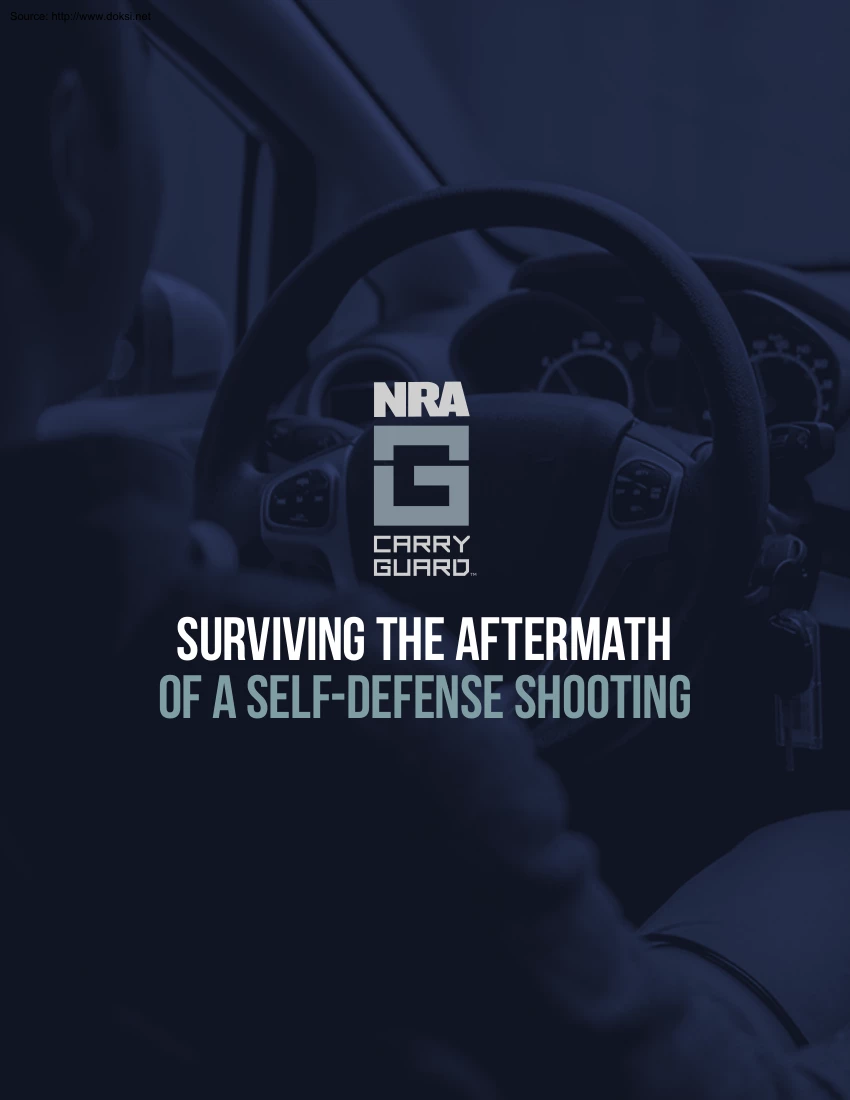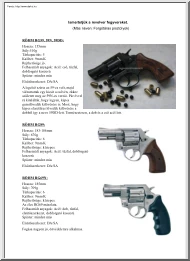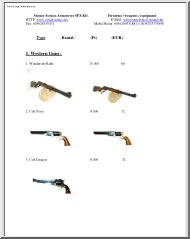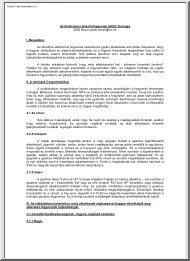Datasheet
Year, pagecount:2017, 9 page(s)
Language:English
Downloads:2
Uploaded:June 21, 2018
Size:2 MB
Institution:
-
Comments:
Attachment:-
Download in PDF:Please log in!
Comments
No comments yet. You can be the first!Content extract
Source: http://www.doksinet Surviving The Aftermath Of A Self-Defense Shooting Source: http://www.doksinet THE experts tell you what you need to know Engaging in a self-defense shooting is likely to be the single most traumatic event of your life. Physiologically you will be riding an uncontrollable adrenaline surge and experiencing symptoms common in a fight-or-flight situation, from tunnel vision to auditory shutdown. Making the correct decisions in this state will be difficult, but doing so can mean the difference between a calm and professional encounter with the police and a ride to the station in handcuffs. A mistake now could cause you to deal with years of legal proceedings, pay extravagant damages in a civil suit or even spend time in prison. “The post-shooting, or post-use of force experience is a meat grinder that everyone goes through.” Firearms Attorney Chuck Michel 2 NRA Carry Guard is designed to provide you with the training you need to keep your life
together after an armed self-defense encounter. This guide will provide you with the basic instructions on how to navigate the aftermath of a defensive shooting, provided by experts with a wealth of real-world experience. • What do I do with my gun? • How do I ensure my safety? • How much should I say to the police? • Am I going to be detained? All these questions and more will be addressed in the following pages. Source: http://www.doksinet THE PARTIES TO A DEFENSIVE SHOOTING YouThe Armed Citizen The 9-1-1 Dispatcher As you begin coming down from the adrenaline rush, you will most likely feel a powerful inclination to talk about what just happened. It is imperative that you limit what you say at this point. Every word you say to the 9-1-1 dispatcher, to bystanders or to the police is able to be used against you. Even if the police find no evidence to support a criminal case against you, you might find yourself liable for damages in a civil lawsuit. Say what is necessary
and nothing more You should stay on the line with the emergency dispatcheror allow someone else on the scene to do sountil the police arrive. They need to know where to find you, who is the suspect and who is the defensive shooter, so that they can relay this information to the police. Explaining yourself beyond these vital details can only put you at risk. The Suspect In most cases, the suspect who caused you to fear for your life will flee once your gun comes out, regardless of whether or not they are woundedor they will be unresponsive. It is unlikely that you will encounter a wounded suspect who remains on the scene. “I do not think that citizens should try to hold people at gunpoint until the cops get there,” says Rich Emberlin, a retired Dallas police officer whose long tenure included over 15 years on the SWAT team. Instead, allow them to escape and provide a detailed description so that police will be able to apprehend them. Bystanders At the scene of the shooting there
may be family members, neighbors or even strangers. They will probably be at least as frightened as you, so provide reassurances that the police are coming but do not attempt to explain the details of the shooting to them. You will all be prone to confusion at this point and may later offer conflicting or inaccurate accounts of the incident. 3 “I think citizens assume that cops know who the good guys are, and we don’t.” Rich Emberlin The Police Police responding to the scene cannot afford to take on faith that you do not pose a threat to them. According to veteran Navy SEAL and firearms instructor Jeff Gonzales, “The facts of the case should point to your being justified, but in the process they don’t know and it is their job to discover the truth.” Be courteous to them and do not take offense if they handcuff or restrain you while disarming youthey are only trying to ensure the safety of everyone present. Veteran Green Beret and NRA Carry Guard Lead Instructor Jeff
Houston recommends, “The key here is being completely compliant with all commands and showing absolutely no resistance or sudden movements.” The police need to be able to establish the basic facts corroborating your account of a defensive shootingall the details can come later. Source: http://www.doksinet WAITING FOR THE POLICE Do not disarm until you hear the police arriving; you do not know whether there is a continuing threat. NRA Carry Guard Lead Instructor Jeff Houston recommends reloading or topping off your gun in case of any new threats. Then call 9-1-1 without delay, and calm yourself as much as possible as you wait for the police. Make sure to convey that the shooting was a defensive one and provide a detailed description of the suspect, then of yourself and anyone else present. While you are awaiting the arrival of the police, take note of key details that the police are likely to ask about later. If a wounded suspect remains on the scene, do not attempt to threaten
themunless they physically attack you, you do not have the justification to shoot them again. Rich Emberlin suggests moving to a safe area nearby if you perceive a continuing threat. “When police are on the scene, keep your firearm clearly pointed in a safe direction, away from police and citizens. Ideally, you will holster your firearm just as they are arriving so that they do not see you manipulating a firearm at all.” NRA Carry Guard Lead Instructor Jeff Houston 4 Listen for the police and try to make sure that you don’t have your firearm in your hand when they arrive. Jeff Gonzales emphasizes paying attention to safety: “Carefully holster, ensuring your finger is straight on the frame and there is no obstruction near or in your holster, then control the firearm back into the holster.” If you don’t have a holster, carefully put your gun down in a safe place where the suspect and any bystanders cannot reach it. Calmly identify yourself to the police as the “good
guy” or the one who made the call. Do not touch your firearmallow the police to disarm you and to take whatever additional precautions they deem necessary. Source: http://www.doksinet talking to THE POLICE It is important to establish for police that you were in fear for your life and did what you felt was necessary to neutralize the threat. Do not become so intent on not incriminating yourself that you fail to give them the basics that they need to protect the safety of the scene, identify the attacker and witnesses and establish your defensive role. As Emberlin says, “They’re going to take in everything; they’re going to assume the worst, though.” Refusing to speak with the police at all is a good way to get yourself unnecessarily arrested. Express your intention to cooperate without volunteering extraneous details. Chuck Michel recommends politely stating that you intend to give a full statement once you have spoken with your legal counsel. In many cases, the police
will schedule a time for you to visit the police station and give your statement. In some instances they may want you to come down to the station right away. Do not argue or try to talk them out of detaining you if they decide to do so. 5 “Nothing that you say generally is going to stop the police from arresting you if they think they have the justification to arrest you in the first place. All you can do is make the situation worse.” Firearms Attorney Chuck Michel Source: http://www.doksinet What happens to your gun? The firearm that you used in the self-defense incident will be confiscated by law enforcement officers when they arrive and sent away for forensic testing. In order to properly investigate the shooting, the police will need to confirm that your firearm is functional and matches the type of ammunition found at the scene. You should assume that your gun will not be returned to you for at least a month; sometimes the process has been known to take well over a year.
6 Rich Emberlin advises that if police do not find evidence leading to your arrest, they are unlikely to confiscate any other firearms that you own. You should be able to continue protecting yourself with your backup gun(s) while waiting for the firearm used in the incident to be returned. If you do not have another gun, it may be advisable to buy one as soon as possible if you can legally do soespecially if you have reason to fear retaliation from associates of the suspect. Source: http://www.doksinet PREPARING FOR THE LEGAL BATTLE Once you have retained a lawyer and given your full statement to police, you can expect to be asked for a number of specific details about the incident, some of which probably did not stand out to you as pertinent what clothing you were wearing, for instance, or where someone was positioned in a room. Try to be prepared by visualizing the scene beforehand and memorizing all of the details that you can. If the police did not find evidence of criminal
action on your part, Rich Emberlin says that the questioning process is unlikely to be adversarial. Just remember that your innocence in the eyes of the law does not mean that you are safe from liability in a civil suit. 7 “A lot of people will say, well, if you’re innocent, it’s pretty simple,” Marcus Allen Weldon, an armed citizen from Detroit who faced the nightmare of criminal charges, told NRATV’s Cam Edwards. “But you’re thinking, does the jury get it?” If you face the misfortune of being arrested and subjected to a trial, your state’s laws on self-defense are likely to have less bearing on your fate than the optics of your case. If you are to prevail, you will need to have avoided irresponsible remarks and provided a coherent and accurate statement to police. Your fate will rest on your attorney’s ability to convince the jury that your actions taken in self-defense were reasonable and justified. Source: http://www.doksinet WHAT NRA CARRY GUARD GIVES YOU
We continue to hear stories of individuals who spend years trapped in the court system for lawful acts of self-defense, sacrificing their quality of life and facing exorbitant legal fees. What you do in the aftermath of a defensive shooting can make or break everything you hold dear for years to comeyour finances, your family life, your employability and your reputation. Having a game plan can save you negative consequences that last a lifetime. NRA Carry Guard offers you the protection to survive the aftermath of a self-defense shooting. Your second call after 9-1-1 should be to the members’ hotline. NRA Carry Guard will also provide you with access to legal assistance and the ability to select your own counsel. 8 Source: http://www.doksinet THE BEST PROTECTION FOR YOU AND YOUR FAMILY Already a member? Enjoy the peace of mind that NRA Carry Guard offers you, and take advantage of our extensive training resources. Interested in joining? Visit www.NRACarryGuardcom or call
1-866-NRA-5050 for more information. 9
together after an armed self-defense encounter. This guide will provide you with the basic instructions on how to navigate the aftermath of a defensive shooting, provided by experts with a wealth of real-world experience. • What do I do with my gun? • How do I ensure my safety? • How much should I say to the police? • Am I going to be detained? All these questions and more will be addressed in the following pages. Source: http://www.doksinet THE PARTIES TO A DEFENSIVE SHOOTING YouThe Armed Citizen The 9-1-1 Dispatcher As you begin coming down from the adrenaline rush, you will most likely feel a powerful inclination to talk about what just happened. It is imperative that you limit what you say at this point. Every word you say to the 9-1-1 dispatcher, to bystanders or to the police is able to be used against you. Even if the police find no evidence to support a criminal case against you, you might find yourself liable for damages in a civil lawsuit. Say what is necessary
and nothing more You should stay on the line with the emergency dispatcheror allow someone else on the scene to do sountil the police arrive. They need to know where to find you, who is the suspect and who is the defensive shooter, so that they can relay this information to the police. Explaining yourself beyond these vital details can only put you at risk. The Suspect In most cases, the suspect who caused you to fear for your life will flee once your gun comes out, regardless of whether or not they are woundedor they will be unresponsive. It is unlikely that you will encounter a wounded suspect who remains on the scene. “I do not think that citizens should try to hold people at gunpoint until the cops get there,” says Rich Emberlin, a retired Dallas police officer whose long tenure included over 15 years on the SWAT team. Instead, allow them to escape and provide a detailed description so that police will be able to apprehend them. Bystanders At the scene of the shooting there
may be family members, neighbors or even strangers. They will probably be at least as frightened as you, so provide reassurances that the police are coming but do not attempt to explain the details of the shooting to them. You will all be prone to confusion at this point and may later offer conflicting or inaccurate accounts of the incident. 3 “I think citizens assume that cops know who the good guys are, and we don’t.” Rich Emberlin The Police Police responding to the scene cannot afford to take on faith that you do not pose a threat to them. According to veteran Navy SEAL and firearms instructor Jeff Gonzales, “The facts of the case should point to your being justified, but in the process they don’t know and it is their job to discover the truth.” Be courteous to them and do not take offense if they handcuff or restrain you while disarming youthey are only trying to ensure the safety of everyone present. Veteran Green Beret and NRA Carry Guard Lead Instructor Jeff
Houston recommends, “The key here is being completely compliant with all commands and showing absolutely no resistance or sudden movements.” The police need to be able to establish the basic facts corroborating your account of a defensive shootingall the details can come later. Source: http://www.doksinet WAITING FOR THE POLICE Do not disarm until you hear the police arriving; you do not know whether there is a continuing threat. NRA Carry Guard Lead Instructor Jeff Houston recommends reloading or topping off your gun in case of any new threats. Then call 9-1-1 without delay, and calm yourself as much as possible as you wait for the police. Make sure to convey that the shooting was a defensive one and provide a detailed description of the suspect, then of yourself and anyone else present. While you are awaiting the arrival of the police, take note of key details that the police are likely to ask about later. If a wounded suspect remains on the scene, do not attempt to threaten
themunless they physically attack you, you do not have the justification to shoot them again. Rich Emberlin suggests moving to a safe area nearby if you perceive a continuing threat. “When police are on the scene, keep your firearm clearly pointed in a safe direction, away from police and citizens. Ideally, you will holster your firearm just as they are arriving so that they do not see you manipulating a firearm at all.” NRA Carry Guard Lead Instructor Jeff Houston 4 Listen for the police and try to make sure that you don’t have your firearm in your hand when they arrive. Jeff Gonzales emphasizes paying attention to safety: “Carefully holster, ensuring your finger is straight on the frame and there is no obstruction near or in your holster, then control the firearm back into the holster.” If you don’t have a holster, carefully put your gun down in a safe place where the suspect and any bystanders cannot reach it. Calmly identify yourself to the police as the “good
guy” or the one who made the call. Do not touch your firearmallow the police to disarm you and to take whatever additional precautions they deem necessary. Source: http://www.doksinet talking to THE POLICE It is important to establish for police that you were in fear for your life and did what you felt was necessary to neutralize the threat. Do not become so intent on not incriminating yourself that you fail to give them the basics that they need to protect the safety of the scene, identify the attacker and witnesses and establish your defensive role. As Emberlin says, “They’re going to take in everything; they’re going to assume the worst, though.” Refusing to speak with the police at all is a good way to get yourself unnecessarily arrested. Express your intention to cooperate without volunteering extraneous details. Chuck Michel recommends politely stating that you intend to give a full statement once you have spoken with your legal counsel. In many cases, the police
will schedule a time for you to visit the police station and give your statement. In some instances they may want you to come down to the station right away. Do not argue or try to talk them out of detaining you if they decide to do so. 5 “Nothing that you say generally is going to stop the police from arresting you if they think they have the justification to arrest you in the first place. All you can do is make the situation worse.” Firearms Attorney Chuck Michel Source: http://www.doksinet What happens to your gun? The firearm that you used in the self-defense incident will be confiscated by law enforcement officers when they arrive and sent away for forensic testing. In order to properly investigate the shooting, the police will need to confirm that your firearm is functional and matches the type of ammunition found at the scene. You should assume that your gun will not be returned to you for at least a month; sometimes the process has been known to take well over a year.
6 Rich Emberlin advises that if police do not find evidence leading to your arrest, they are unlikely to confiscate any other firearms that you own. You should be able to continue protecting yourself with your backup gun(s) while waiting for the firearm used in the incident to be returned. If you do not have another gun, it may be advisable to buy one as soon as possible if you can legally do soespecially if you have reason to fear retaliation from associates of the suspect. Source: http://www.doksinet PREPARING FOR THE LEGAL BATTLE Once you have retained a lawyer and given your full statement to police, you can expect to be asked for a number of specific details about the incident, some of which probably did not stand out to you as pertinent what clothing you were wearing, for instance, or where someone was positioned in a room. Try to be prepared by visualizing the scene beforehand and memorizing all of the details that you can. If the police did not find evidence of criminal
action on your part, Rich Emberlin says that the questioning process is unlikely to be adversarial. Just remember that your innocence in the eyes of the law does not mean that you are safe from liability in a civil suit. 7 “A lot of people will say, well, if you’re innocent, it’s pretty simple,” Marcus Allen Weldon, an armed citizen from Detroit who faced the nightmare of criminal charges, told NRATV’s Cam Edwards. “But you’re thinking, does the jury get it?” If you face the misfortune of being arrested and subjected to a trial, your state’s laws on self-defense are likely to have less bearing on your fate than the optics of your case. If you are to prevail, you will need to have avoided irresponsible remarks and provided a coherent and accurate statement to police. Your fate will rest on your attorney’s ability to convince the jury that your actions taken in self-defense were reasonable and justified. Source: http://www.doksinet WHAT NRA CARRY GUARD GIVES YOU
We continue to hear stories of individuals who spend years trapped in the court system for lawful acts of self-defense, sacrificing their quality of life and facing exorbitant legal fees. What you do in the aftermath of a defensive shooting can make or break everything you hold dear for years to comeyour finances, your family life, your employability and your reputation. Having a game plan can save you negative consequences that last a lifetime. NRA Carry Guard offers you the protection to survive the aftermath of a self-defense shooting. Your second call after 9-1-1 should be to the members’ hotline. NRA Carry Guard will also provide you with access to legal assistance and the ability to select your own counsel. 8 Source: http://www.doksinet THE BEST PROTECTION FOR YOU AND YOUR FAMILY Already a member? Enjoy the peace of mind that NRA Carry Guard offers you, and take advantage of our extensive training resources. Interested in joining? Visit www.NRACarryGuardcom or call
1-866-NRA-5050 for more information. 9





 When reading, most of us just let a story wash over us, getting lost in the world of the book rather than paying attention to the individual elements of the plot or writing. However, in English class, our teachers ask us to look at the mechanics of the writing.
When reading, most of us just let a story wash over us, getting lost in the world of the book rather than paying attention to the individual elements of the plot or writing. However, in English class, our teachers ask us to look at the mechanics of the writing.